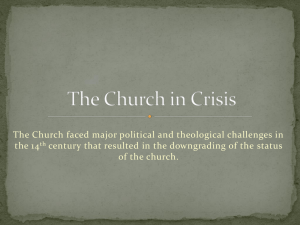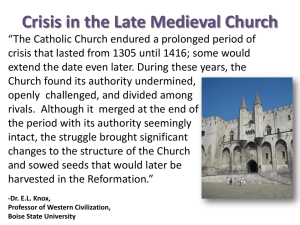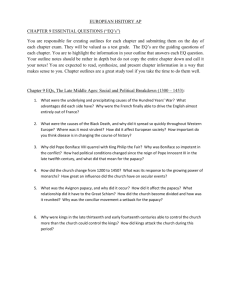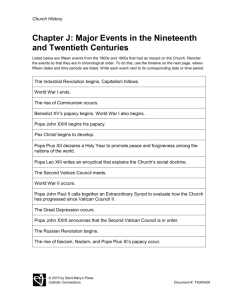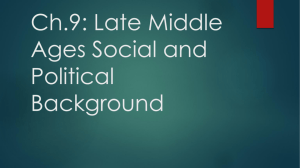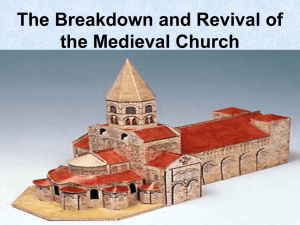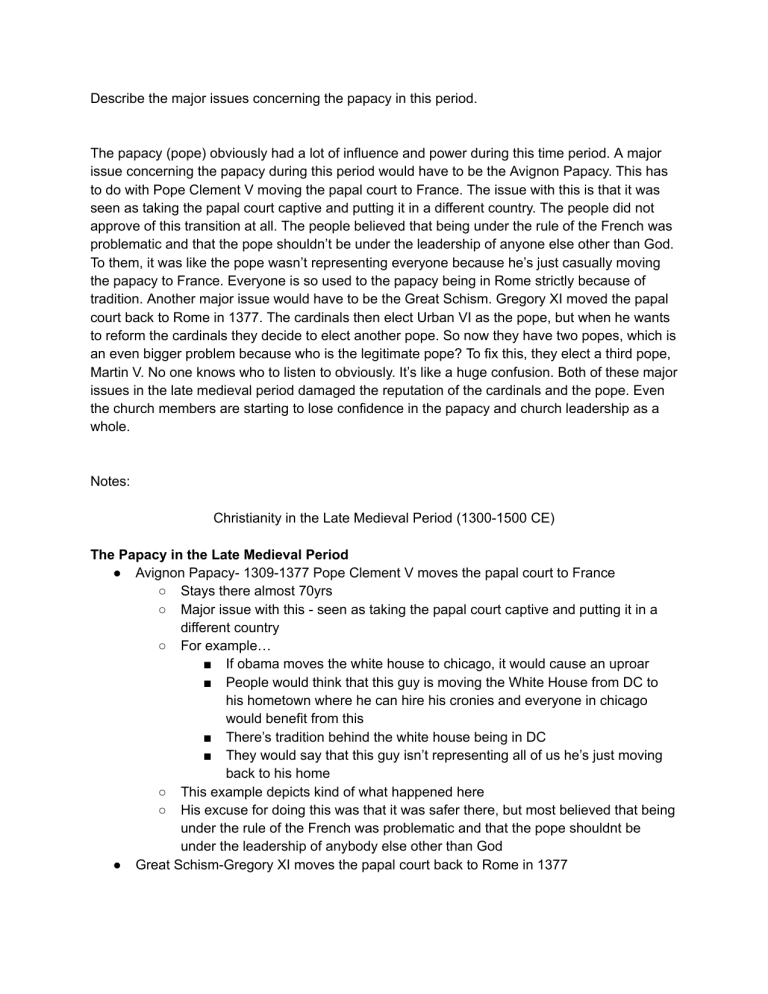
Describe the major issues concerning the papacy in this period. The papacy (pope) obviously had a lot of influence and power during this time period. A major issue concerning the papacy during this period would have to be the Avignon Papacy. This has to do with Pope Clement V moving the papal court to France. The issue with this is that it was seen as taking the papal court captive and putting it in a different country. The people did not approve of this transition at all. The people believed that being under the rule of the French was problematic and that the pope shouldn’t be under the leadership of anyone else other than God. To them, it was like the pope wasn’t representing everyone because he’s just casually moving the papacy to France. Everyone is so used to the papacy being in Rome strictly because of tradition. Another major issue would have to be the Great Schism. Gregory XI moved the papal court back to Rome in 1377. The cardinals then elect Urban VI as the pope, but when he wants to reform the cardinals they decide to elect another pope. So now they have two popes, which is an even bigger problem because who is the legitimate pope? To fix this, they elect a third pope, Martin V. No one knows who to listen to obviously. It’s like a huge confusion. Both of these major issues in the late medieval period damaged the reputation of the cardinals and the pope. Even the church members are starting to lose confidence in the papacy and church leadership as a whole. Notes: Christianity in the Late Medieval Period (1300-1500 CE) The Papacy in the Late Medieval Period ● Avignon Papacy- 1309-1377 Pope Clement V moves the papal court to France ○ Stays there almost 70yrs ○ Major issue with this - seen as taking the papal court captive and putting it in a different country ○ For example… ■ If obama moves the white house to chicago, it would cause an uproar ■ People would think that this guy is moving the White House from DC to his hometown where he can hire his cronies and everyone in chicago would benefit from this ■ There’s tradition behind the white house being in DC ■ They would say that this guy isn’t representing all of us he’s just moving back to his home ○ This example depicts kind of what happened here ○ His excuse for doing this was that it was safer there, but most believed that being under the rule of the French was problematic and that the pope shouldnt be under the leadership of anybody else other than God ● Great Schism-Gregory XI moves the papal court back to Rome in 1377 ○ ● ● Cardinals elect Urban VI, and all of a sudden there’s some controversy because he wants to reform the cardinals ■ And they say well then we made a mistake here let's elect another pope ■ Now they have two popes (which is the legitimate pope) ■ The church gets together ■ Try to figure out how to fix this because you can’t have two popes ● So they elect a third pope (Martin V) For almost 100yrs you have either the papal court in the wrong place or you have 2 or 3 popes - damages the reputation of the cardinals and the pope ○ Church members lose confidence in pope and church leadership Council of Constance- 1414-1418 - elects Martin V Bubonic Plague ● Images of a suffering Jesus ○ You see this a lot during this time to demonstrate that Jesus suffers with those who are suffering ○ Over 50% of people during this time died because of this, and they died fairly quickly (this does a lot to your psyche) ■ Folks were scared to death ■ They believed that God was judging their church and their community ■ They had a great fear of death and dying and the consequences of that ■ As a result of this there were flagellants who went around and would beat themselves and punish their bodies in penance for those who were sinful and dying ● Ended up spreading the plague as they went town to town ○ There was a real fear of God’s Judgment ○ Two types of ministers ■ Those who would go out and anoint the sick and minster to the poor and pray for them ● But of course they would contract the deadly disease, so there became a real need for ministers ● The ministers who didn’t want to help people (stayed in their homes and didn’t minister those who were sick) were the ones who were spared ● Many of the clergy that filled in had neve been educated ○ They didn’t know about the biblical texts and they weren’t properly administering the sacraments ● Killed about ⅓ of the population ● Speed of illness ● Symptoms ● Transmission ● Religious effect ○ Flagellants ○ Judgment ● ○ Death of ministers Bubonic plague caused a major impact on the life of the church during this period John Wycliffe (1330-1384) ● The Church would consider him a heretic ● Preached against the papacy bc of the schism and avignon papacy ○ Preached against the authority of the pope ● Emphasized poverty ○ Common among the heretics during this period ○ Trying to counteract those in the church who were greedy and actually profiting from the fears of the church members ○ ● Invisible church ○ This was Wycliffe’s idea ○ Believed that if you came to church on Sunday you see a lot of folks who were there, however, that’s visible church ■ The invisible church are the ones who were there but are actually followers of Christ and admit to faith in Christ ■ The invisible church didn’t include the priest because they were corrupt ● Wanted Bible translated into English ○ This was seen as a huge threat to the church bc the clergy were the ones who were responsible for reading and interpreting the texts to the common people ○ The common people couldn’t read the Bible because it was in Latin, and most couldn’t read Latin ■ They were at the mercy of the clergy to interpret Scripture to them and explain the faith to them ○ He wanted the Bible in the hands of the common people so they had access to God because he didn’t trust the clergy or the papacy ● Because he lived in England he was a little bit protect from the pope ○ He was condemned by the church but wasn’t killed for his heresy ● But in 1428 when the was stronger control of the church in England, his bones were exhumed, burned, and thrown into the river Jan Hus (1372-1415) ● Bohemian reformer ● Teachings were similar to Wycliffe’s but he didn’t buy into all of Wyclffe’s beliefs ● Bc he was a little more accessible to the church he was condemned for his and Wycliffe’s beliefs ● Believed in the importance and authority of Scripture ○ Believed that scripture was more important than the tradition of the church ○ And so doctrine and christian beliefs and actions should be based on scripture alone and not the authority of the church ● Appalled at the Schism ○ ● ● ● Said that this was one of the reasons why you had to believe in the authority of scripture vs the authority of the leadership of the church, which included the pope Against indulgences Because of the crisis of leadership in the church he argued that Christ alone is the head of the church Because he lived in an area that was controlled by the church, he was burned at the stake for heresy in 1415 Catherine of Siena (1347-1380) ● Had numerous visions that focused on a mystical marriage with Christ and the blood of Christ ○ Focused her writings on the blood of christ and how it covers up sins and heals us - did this during the time of the plague ● Became a Dominican tertiary and ministered to the poor ● Wrote against the Avignon controversy ○ Saw it as a scandal in the church Julian of Norwich (1342-1417) ● Had a set of visions during a severe illness ● Spent the remainder of her life contemplating and interpreting the visions ● Was an anchoress (one who is anchored to a church) ○ So she lived within the walls of church and ministered to those who came before her for prayer and ministry ● Vision of God transcended gender - believed God wasn’t male or female. He transcended gender ● Christ is a suffering savior of all ○ One of the few Christians during this time who believed that Christ’s blood/death covers the sins of everyone ■ We all are saved from Jesus’ work on the cross
